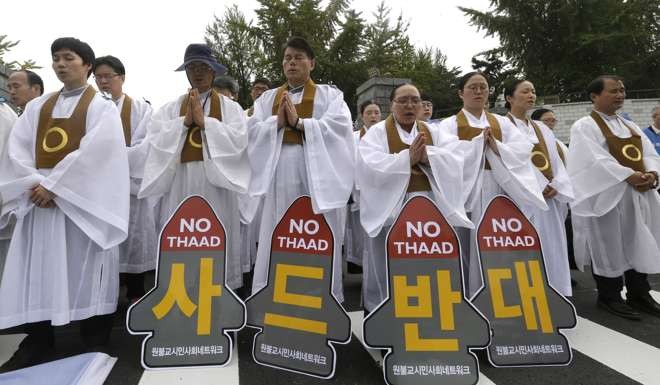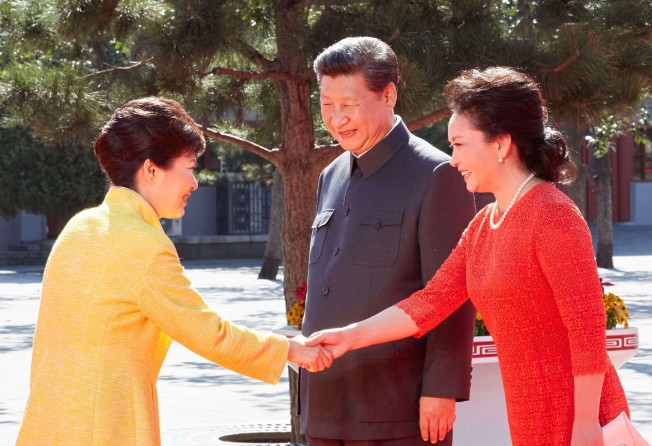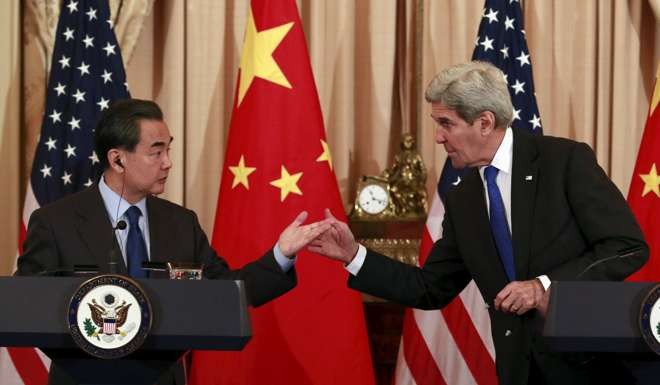
Why rising power Beijing must take note of long US shadow over South Korea
Jaeho Hwang says the overall trend of China-Korea ties is on the rise, despite the Thaad fallout, but Beijing will need to win international consensus to truly replace Washington as a stabilising force for Seoul

I have attended several security forums in Western countries where the focus of all discussion was China. The war of words between the collective West, led by the United States, and China reminded me of the Feast at Hong Gate (Hongmenyan), a historical event during the Chu-Han contention in ancient China. Chu’s leader Xiang Yu invited his nemesis Liu Bang and his men to a banquet at Hong Gate, during which Xiang’s cousin, Xiang Zhuang, performed a sword dance in a bid to assassinate Liu, and Xiang’s uncle, Xiang Bo, joined in to thwart the attempt.
The Xiangshan Forum, held in Beijing from October 10-12, was different in many ways, though China and Russia made an unexpected move when they publicly opposed the deployment of the US-led anti-missile system. The move, on the sidelines of the forum, left the impression that China was hiding a dagger behind its smile. Nonetheless, to get back to the analogy of the Hong Gate feast, the forum featured more drink-sharing than sword-waving, with Beijing’s military leadership presenting strategic dialogue and mutual trust as its central agenda.

Right after 2013, just after South Korean President Park Geun-hye and President Xi Jinping ( 習近平 ) were both sworn in as leaders of their respective countries, bilateral ties were at an all-time high. However, the situation took a turn when the South, in the wake of North Korea’s fourth nuclear test in January, announced the US-backed plan to deploy a Terminal High-Altitude Area Defence (Thaad) unit on its soil. Beijing holds the key to Seoul’s economic prosperity and the reunification of the two Koreas. With bilateral ties at a low, every decision of the South adds to the sense of anxiety in the region.
In February, Chinese Foreign Minister Wang Yi ( 王毅 ) likened the US to Xiang Yu for enticing South Korea to deploy its Thaad system, and his own country to Liu Bang. Then, taking the South’s current national standing into account, which figure from the Chu-Han era would best represent it? Seoul is in no way a Xiang Zhuang, as it never targets Beijing directly. Xiang Bo, who influenced Xiang Yu’s key decisions to Liu’s benefit, is not an appropriate choice, either.

The appropriate figure for South Korea did not take centre stage in the story. It is Ji Bu, a Chinese general who served Xiang Yu. Chivalrous and brave, he was a man of his word. If China likens itself to Liu Bang, it should treat South Korea the way Liu treated Ji. After Xiang Yu’s defeat, Ji achieved many great deeds for Liu’s empire.
The overall trend of Beijing-Seoul ties is on the rise. China needs to understand the predicaments facing the South
But where do relations between Beijing and Seoul stand? One has to admit Washington’s contribution to stabilising the South, in terms of both its economy and security. Is China prepared for the same role? China is indeed emerging as a great power, but only regionally.
President Park’s attendance at China’s military parade, marking its victory in the second world war, in Beijing last year was indeed a symbolic event for the two nations. In other words, the overall trend of Beijing-Seoul ties is on the rise. China needs to understand the predicaments facing the South and help it to overcome them. Then, when the time is right, Seoul can be of great assistance to Beijing.
The theme of this year’s Xiangshan Forum was about building a new type of international relations. China’s “China Dream” can be likened to Liu Bang’s preparations for his new kingdom. Yet, the will of the international community is important.
For the US and China, gaining the hearts of the members of the international community is key to winning the leadership battle. Once consensus is reached, who’s the more suitable leader will become clearer.
Jaeho Hwang is director of the Global Security Cooperation Centre at Hankuk University of Foreign Studies, Seoul